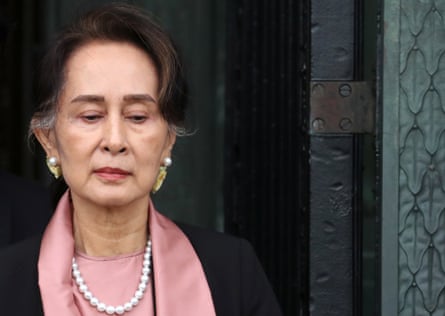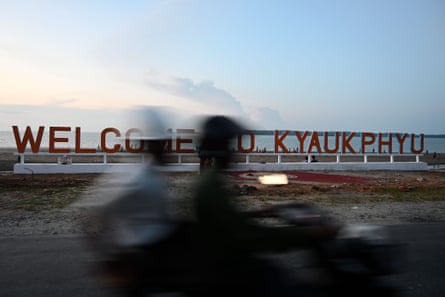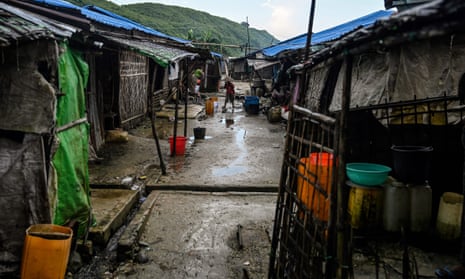The UK has broken ranks with the UN and will keep funding “closed” Rohingya camps inside Myanmar despite fears that doing so may entrench “apartheid-like” conditions in the country, the Guardian has learned.
Internal briefing documents as well as interviews with UN and humanitarian agency officials in Myanmar showed the British government was maintaining a policy of providing aid and other support to displaced people living in camps in Myanmar’s Rakhine state that have been slated for closure since 2017.
The facilities have been criticised for being squalid, unsanitary and entrenching the segregation of Rohingya and other Muslim minorities, who in most cases are prevented from leaving.
The UN took a stand in June that they would withhold support “beyond life-saving assistance” to camps officially “closed” by the Myanmar government – many of which are in reality still operating as before – and others in the process of being closed, until the Rohingya and other minorities were given greater freedom of movement.
The UK’s Department for International Development (DfID) declined to explain its reasoning for not adopting the UN’s stronger stance but said it supported the same broad goals. “The UK supports the UN’s position that displaced people must have the freedom to move, seek out livelihoods and access services like health and education,” a spokeswoman said.
A senior humanitarian official in Myanmar said the unwillingness of a major donor such as the UK to back the UN’s stand would “completely undermine” efforts to present a united front to pressure the Myanmar government on the issue.

The UK’s position emerged as Myanmar’s highest civilian leader, Aung San Suu Kyi, travelled to The Hague to offer the most high-profile defence yet of her country’s treatment of the Rohingya and other minorities. A filing to the Hague-based international court of justice last month accused Myanmar of committing crimes against humanity including genocide against the Rohingya and other groups.
More than 128,000 Rohingya and Kaman Muslims have been housed in camps in Rakhine state since fleeing their homes in a 2012 outburst of violence against their communities.
For the past six months the UN and its partner agencies have been preparing to reduce their activities and begin a gradual withdrawal of support from the camps. Announcing the policy change, the UN’s highest-ranked official in Myanmar at the time, Knut Osby, said working as normal in the camps risked “entrenching segregation”, and said future support would be linked to “tangible progress made on the fundamental issue of freedom of movement”.
Though the camps have been in the process of being closed for the past two years, internal UN assessments seen by the Guardian and accounts from humanitarian agencies on the ground have shown that conditions have barely changed. Residents of camps that have been closed have been moved to newly built facilities, some on the same site as the old ones, where conditions are still poor and freedom of movement remains restricted.
In a briefing document produced by DfID in June, the department considered the new UN policy of cutting all but life-saving aid to these camps but said it would not adopt it. “We will provide aid according to need and without conditionality (regardless of government’s action or inaction, though we call for the government to take responsibility for all its people),” the note read.
The document argued that “generations are being lost” inside the camps and that health and educational support is necessary to stem the damage to those living in them. It adds that people in the camps should be consulted on the approach they think would be best.
Neither the UN nor DfID are understood to have substantially changed their positions since the note was circulated.

Myanmar rejects allegations it is committing crimes against humanity in Rakhine state, and has initiated a domestic inquiry into the latest outbreak of mass violence against the Rohingya in the summer of 2017, which led to more than 700,000 people fleeing to neighbouring Bangladesh.
A UN review of its own performance published in June was scathing of the organisation’s “obviously dysfunctional performance” in Myanmar, arguing that senior staff were unable or unwilling to find common ground between factions who wanted to constructively engage with the government and others who wanted to advocate against what they saw were grave human rights abuses. The lack of a common position was exploited by the Myanmar government to forward its own agenda, the report said.
A humanitarian specialist based in Yangon, who asked not to be identified, said aid providers had “no good options”. “Even cutting down to lifesaving aid will have an impact [on the lives of people in the camps],” the specialist said.
“However, continuing to facilitate what are essentially apartheid-like conditions is not an option either.”
They added that those on the ground who supported the UN’s stance on withholding aid felt “frustration with DfID, since they’re perceived to be undermining the whole process”.

Concerns the UK is advocating a softer line on Myanmar than others in the international community extend beyond the camps. The Guardian understands from several sources that London has been proposing the establishment of a “hybrid court” to deal with alleged crimes against the Rohingya and other minorities.
“The issue was raised [by British government representatives to the UN] many times in 2018 and this year as recently as October,” a source familiar with the process said. “The Tatmadaw [Myanmar’s army] is unlikely to agree with it if there’s the slightest possibility that it will be effective.”
A hybrid court would involve alleged offenders being tried in a court overseen by a team of international and domestic judges. The proposal was criticised by the reports of a UN fact-finding mission investigating the situation in Rakhine state, which said the hybrid court would be unlikely to meet international standards.
A Foreign Office spokesperson said: “The UK wants to see accountability for atrocities committed in Myanmar, but it is not UK policy to pursue a hybrid court.”
